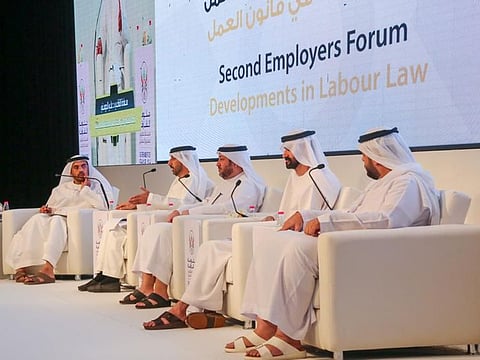New UAE Labour Law: Top officials explain rights of workers, employers during forum
Wages, leave, dismissal and other aspects covered at 'Second Employers Forum' in Sharjah

Sharjah: An employee fired for drinking alcohol while working from home and a manager sacked for telling a staff member he was “not worth one Franc” (currency coin) were among the cases highlighted during a UAE labour law forum in Sharjah on Tuesday.
The ‘Second Employers Forum: Developments in Labour Law’ was organised by Sharjah Labour Standards Development Authority (LSDA) at Al Jawaher Reception and Convention Centre.
The one-day forum heard from government officials and legal experts to raise awareness about the UAE Labour Law and its recent provisions – the largest update since the law’s issuance over 40 years ago.
The event was attended by 300 owners and managers of companies that have a large workforce.
Falling cases
Greater awareness of the law can reduce the number of cases at labour courts, officials said. In Dubai, the number of labour cases registered with Dubai labour court dropped to 13,381 in 2021, compared to 14,952 in 2020, Judge Dr Ali Al Hosani, Appeals Judge and Director of the Technical Office of the Labour Court in Dubai, told Gulf News on the sidelines of the forum.
Also, 2,379 cases were solved amicably in 2021 compared to 1,812 cases in the Dubai labour court, he added.
‘Qualitative leap’
LSDA Chairman Salem Youssef Al Qaseer said the forum coincides with the issuance of a decree by His Highness Dr Sheikh Sultan bin Muhammad Al Qasimi, Supreme Council Member and Ruler of Sharjah to reorganise LSDA, with the support of the Executive and Consultative Councils of the Emirate of Sharjah, to enhance awareness of labour standards legislation and developing institutional partnerships with the public and private sectors.
Al Qaseer said: “The new law regulating labour relations is the largest update of the law since its issuance more than 40 years ago. That is why we [LSDA] were keen to dedicate this forum to talk about the developments of this law, which we consider a qualitative leap in the regulation of labour relations.”
He added: “The new law regulating labour relations addresses employers and workers, and defines the rights and obligations of both parties, which, if effectively adhered to, will lead to sustainable work relationships. Therefore, awareness of these rights and obligations will contribute to strengthening that relationship, and this is what we aspire to.”
Al Qaseer told Gulf News that there are 5,000 companies registered in Sharjah and LSDA always follows up their issues. He also mentioned how LSDA and its partners set up 45 libraries at workers’ accommodations, containing books in different languages.
Also speaking at the forum was Dr Ahmed Al Shehhi, Legal Expert and Head of the Labour Complaints Department at the Ministry of Human Resources and Emiratisation, and the session was moderated by Mohammed Butti Al Shamsi, Deputy Director of the Dubai Police Academy and Chairman of the Emirates Association of Lawyers and Legal.
Developments in the law
In the first session of the forum, Dr Al Shehhi reviewed the most important developments in the law on regulating labour relations and compared them with the previous law, especially with regards to the probationary period, the non-competition condition, vacations and one-year ban.
Causes, effects of termination
In the second session, Judge Dr Al Hosani, spoke about the causes and effects of the termination of work relations in the Law and unfair dismissal.
He mentioned the most important employer’s obligations towards the worker and the most important duties on the worker towards the employer. He said that the new law gave more flexibility to the parties in terminating the relationship and did not require the completion of the contract term, and allowed them to terminate the relationship by giving a warning in accordance with the regulations set by the law.
Judge Dr Al Hosani affirmed that there are rights that do not depend on the reason for the end of work, namely wages of all kinds, end of service gratuity, annual leave allowance, reimbursement of residence expenses, experience certificate and work injury compensation.
Open discussion
The third session allowed the attendees to direct their questions and inquiries to the panellists. The inquiries focused on the developments in labour relations in the new law, which were answered by the panelists, namely, Dr Al Hosani, Dr Al Shehhi, and Ahmed Abdul Jabbar Bukhalaf Al Hammadi, Legal Specialist, and Ahmed Abdullah Balshawareb Al Awadi, Assistant Legal Researcher.
Sign up for the Daily Briefing
Get the latest news and updates straight to your inbox



